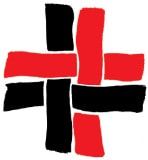Being a Sox fan in Europe means long nights. Games mostly start after midnight, and even the game 3 afternoon start at Fenway (9pm BST) went to extra innings and continued into the early hours. But during the day and early evening, normal life continues and has its own highlights.
One such took place last Friday, the anniversary of my father’s death. After 18 months or so, the International String Quartet series returned to Leamington, featuring the Sacconi Quartet. I had missed their previous performance at the Pump Rooms, a decade ago, so was keen to be right upfront for their return. In a heavily and professionally Covid-proofed auditorium, I managed to reserve Seat B1.
In fact, the attraction was not solely the Sacconi, nor even the return of live chamber music to my neck of the woods; it was the programme.
The Sacconi were to play (after the obligatory Haydn warm-up) the eighth of Shostakovich’s quartets and to devote the second half of the concert to the String Quartet In C# minor, Opus 131 by Beethoven.
The latter has been one of my favourite pieces of music. I have a dozen or more versions of it at home and one of them will doubtless figure in my list of Desert Island Discs. The Sacconi did it more than justice: they are are a powerful, muscular band and they brought out the grandeur of the fugue, the joy (in the Allegro) and passion throughout, whilst addressing the delicacy and profundity of the Adagio. It is a heavy responsibility to play this masterwork. The Sacconi took it on and triumphed.
But by then, we knew they would. We had already heard the Shostakovich 8th, his 1960 response to a visit to a bombed-out Dresden.
I mentioned that it was the anniversary of my father’s death because he was a bomber pilot in the RAF during the war. And a distinguished one, with a DFC and AFC to prove the point.
I do not know whether he was involved in those controversial raids in mid-February 1945, during which the city was systematically destroyed and more than 30,000 civilians are believed to have died. (Some estimates place it over 200,000.) At this stage of the war, the only ‘civilians’ would have been the elderly and sick, women and children.
It has been described as a war crime, principally by those of my political persuasion. But it is significant that Churchill, in his massive 6 volume history of the war, makes no mention of the Dresden destruction.
As I say, I have no idea if my father was one of those involved. He never spoke of it, but then he never spoke of any of his wartime experiences.
But I know enough of him to know that he would have listened to the Shostakovich quartet and, as did Shostakovich himself when it was played to him by the Borodin, “buried his head in his hands and wept”.
Today from the everysmith vaults: Away from performances and mlb.tv, I am listening to English music. Warlock, Delius, Elgar and - currently - Vaughan Williams. It's A Sea Symphony playing right now.






 RSS Feed
RSS Feed